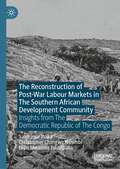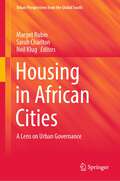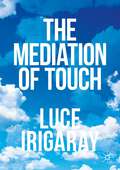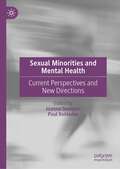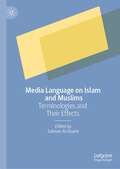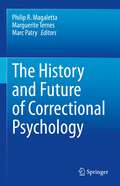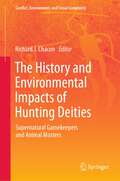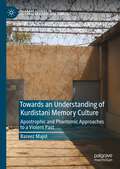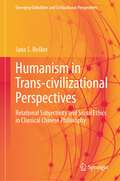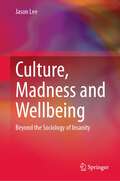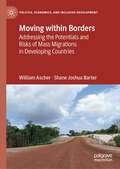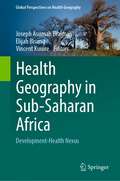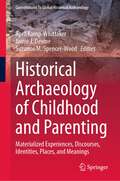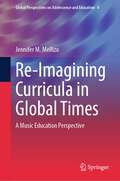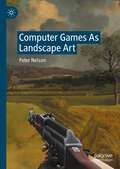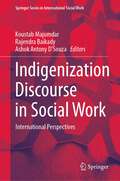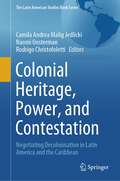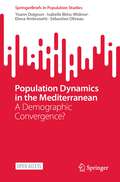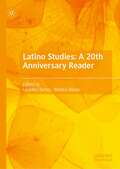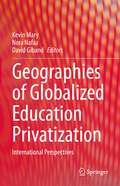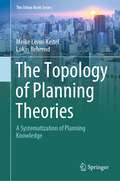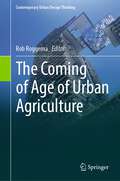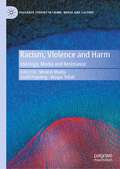- Table View
- List View
Supportive Smart Homes: Their Role in Aging in Place (Synthesis Lectures on Technology and Health)
by Frank Knoefel Bruce Wallace Neil Thomas Heidi Sveistrup Rafik Goubran Christine L. LaurinSignificant health-industry human resource needs increase the reliance on family and friends to support older adults hoping to age in place. This book explores how recent improvements in integrated home technologies have the potential to address those challenges. The book considers how embedded home sensors can be used to monitor the health and wellbeing of older adults and how that can be used to assist with supporting safety and well-being. The content is designed to help multiple stakeholders in the supportive smart home space to better understand the complexity of this field and the need for transdisciplinary collaboration. These stakeholders include the older adults who will benefit from supportive smart home technology; informal and formal caregiver and healthcare professionals concerned about the older adult’s well-being; researchers from multiple disciplines in the supportive smart home area and their funders; companies looking to develop solutions and services or expand their offerings; policy makers who want to ensure privacy and equity in access and a successful integration of these technologies into the evolving health and social services sectors; and students, the future leaders in AgeTech. Overall, the intent of the book is to inspire engineers, computer scientists, industrial designers, clinicians and healthcare providers, social scientists, students, policy makers, and older adults and their caregivers to collaborate in advancing the supportive smart home space to develop more options for aging in place.
The Reconstruction of Post-War Labour Markets in The Southern African Development Community: Insights from The Democratic Republic of The Congo
by Saint José Inaka Christopher Changwe Nshimbi Leon Mwamba TshimpakaThis book provides a comprehensive overview of post-war labour market reconstructions, in the context of a regional bloc whose member states have experienced conflict. Focusing on the Southern African Development Community (SADC) region, the book explores how major conflicts often expose shortcomings in affected countries particularly on their post-war labour market reconstruction processes. The authors discuss how countries in the SADC region in particular are equipped to navigate such processes. This key question drives the overview of relationships between labour market issues and wars of liberation from colonial rule and apartheid, rights to self-determination and racial (in)equality and the need to succinctly explain how labour market issues shaped civil wars in some post-independent SADC member states. The book examines the role of the state in reconstruction processes of post-war labour markets and the contribution of labour market institutions to these reconstructions. It further analyses private sector participation in remaking labour markets and workers’ experiences in finding employment in labour markets under reconstruction. The book provides specific insights from experiences in the Democratic Republic of the Congo (DRC).
Housing in African Cities: A Lens on Urban Governance (GeoJournal Library)
by Margot Rubin Sarah Charlton Neil KlugThis edited collection from across the African continent offers a diverse set of analytical accounts that engage with the urban governance dynamics, drivers and impacts of a wide variety of housing initiatives. These include insights into the relationships between parties and actors undertaking developments, or whose housing activities impact on the city. The book illustrates issues of power distribution, the visions or agendas motivating these actions, and the instruments used to advance them. It considers the rise of mega housing projects; private sector driven residential developments; unobtrusive transformations of existing building stock, establishment and upgrading of informal settlements; and state driven low cost housing schemes. It surfaces the contestation, collaborations and conflicts as well as the power relations that operate within cities and which are made visible on cityscapes. Housing and human settlement scholars as well as those interested in urban politics and governance dynamics in the global south and across the African continent will find much to appreciate in this volume.
The Mediation of Touch
by Luce IrigarayThe first communication between human beings, the one between the newborn and the mother, happens through touch. Strangely this first way of relating to each other has barely been considered by our education and our culture, which have favoured sight to the detriment of touch. And yet touching and being touched means experiencing ourselves as living beings. For lack of such a touch, we do not perceive the limits nor the sensitive potential of our bodies. Then we remain immersed in a natural or a cultural universe, incapable of reaching our own individuation and of knowing our fundamental difference from the other(s).Desire, in particular sexuate desire, is a call for touching one another anew. But this touch requires us to have gained our autonomy and to be able to open up to and commune with the other as transcendent to ourselves while staying in ourselves. This book unveils and explores how touch can act as a basic living mediation in love and,more generally, in our comprehensive individual and collective human becoming. It also considers how touch can contribute to founding a culture respectful of difference instead of subjecting them to an ideal of sameness. We need touch as mediation to fulfil our humanity and to build a truly human thinking and world.
Ignatius Sancho and the British Abolitionist Movement, 1729-1786: Manhood, Race and Sensibility
by G. J. Barker-BenfieldThis book highlights the significant role played by Ignatius Sancho (c. 1729-80), the first black man to vote in England, in the British abolitionist movement. Examining the letters of Sancho, and especially his correspondence with the influential novelist and preacher, Laurence Sterne, the author analyses the relationship between sensibility and antislavery in eighteenth-century Britain. The book demonstrates how Sancho navigated the bawdy, riotous conditions of commercial London, which was the headquarters of a growing and war-torn Empire. It shows how Sancho mastered the fashionable and gendered language of the culture of sensibility, navigating the contemporary issues of race, slavery, and politics. The book also touches on the White metropolitan and colonial preoccupation with Black men’s sexuality, which was intensified by the Somerset decision of 1772. Sancho’s was a unique and influential voice in eighteenth-century Britain, making this book an insightful read for scholars of anti-slavery as well as gender, race and imperialism in British history.
Sexual Minorities and Mental Health: Current Perspectives and New Directions
by Joanna Semlyen Poul RohlederThis edited book presents a comprehensive guide to the research, challenges and differing perspectives within mental health for sexual minority populations in the UK. Drawing on clinical, social, health and community psychology perspectives, it brings the urgency of this topic back to the fore, providing insight into some of ways we understand and make sense of the increased prevalence of poorer mental health in these populations. Using an intersectional approach, a broad range of experts from across academia and practice explore the specific threat and discrimination faced by sexual minorities and investigate the high prevalence of poor mental health, health risk behaviours and psychological distress in these groups. The volume also offers innovative insight as to ways in which the disparities experienced by sexual minorities may be addressed. Ideal for practitioners in mental health and sexuality, as well as psychologists, policy makers, and academics alike interested in mental health, sexuality, public health, psychotherapy, psychoanalysis, or counselling, this collection features wide array of qualitative and quantitative sources to describe the current state of the art with an interdisciplinary lens.
Media Language on Islam and Muslims: Terminologies and Their Effects
by Salman Al-AzamiThis book brings together contributions from ten academics and a commentary from a Muslim community leader on how the British media represent some of the most important terminologies related to Islam and Muslims. It takes a nuanced approach to language within Muslims in the media research by focusing on terminologies. Each contributor in this volume focused on one terminology and its associated words to show how the representation of these terminologies have major implications on the lives of British Muslims. The book also includes some key recommendations on the usage of these terms from the Media Style Guide of the Centre for Media monitoring - a research organisation of the Muslim Council of Britain. This book’s link with the Muslim community can be a step towards new approaches in this field where academics will engage with communities and practitioners to ensure better impact of their academic works. This book will be of interest to students, scholars and practitioners in a range of fields, including Journalism, Media and Communication Studies, English Language and Linguistics, Sociology, Cultural and Religious Studies.
The History and Future of Correctional Psychology
by Philip R. Magaletta Marguerite Ternes Marc PatryThis edited volume provides a comprehensive overview of correctional psychology, considering the history and future of the practice. With contributions from expert leaders in the field of correctional psychology – the application of psychological evaluation, treatment, and management of offenders in jails, prisons, and other correctional settings – the early history is presented through a series of brief biographical sketches of the field’s early pioneers. Moving forward, the period of growth and development of key concepts that advanced and matured the field is presented. Finally, directions that remain relevant as the future of correctional psychology unfolds are presented. Ideal for correctional psychology practitioners, students of correctional and forensic psychology, and those interested in the history of psychology, this unique volume traces the ongoing development of a crucial area of psychological practice.
The History and Environmental Impacts of Hunting Deities: Supernatural Gamekeepers and Animal Masters (Conflict, Environment, and Social Complexity)
by Richard J. ChaconThis edited volume analyzes the belief in supernatural gamekeepers and/or animal masters of wildlife from a cross-cultural perspective. It documents the antiquity and widespread occurrence of the belief in supernatural gamekeepers at the global level. This interdisciplinary volume documents both the antiquity and the widespread geographical distribution of this belief along with surveying the various manifestations of this cosmology by way of studies from Europe, Asia, Africa, and North and South America. Some chapters explore the manifestations of this belief as they appear in petroglyphs/pictographs and other forms of material culture. Others focus on the environmental impacts of these beliefs/rituals and prescribed foraging restrictions by analyzing how they affect game harvests. The internationally recognized scholars in this volume assess the efficacy of this particular form of traditional ecological knowledge (TEK) and investigate if adherence to the belief in animal masters actually causes hunters to refrain from overharvesting wild game and thereby contributes to sustainable hunting practices. This volume is of interest to anthropologists, archaeologists and other social scientists researching traditional ecological knowledge (TEK), indigenous conservation, biodiversity, and sustainability practices, and animal deities.
Towards an Understanding of Kurdistani Memory Culture: Apostrophic and Phantomic Approaches to a Violent Past (Palgrave Studies in Cultural Heritage and Conflict)
by Bareez MajidThis book presents a thorough analysis of the Kurdistan Region of Iraq’s memory culture, focusing particularly on commemorations and representations of the Anfal and Halabja atrocities. The author employs a transdisciplinary approach that draws on Memory Studies, Postcolonial Studies, Heritage Studies, Kurdish Studies, Literary Studies and Trauma Studies, to analyze cultural objects such as Kurdistani literary novels, museums, and school curricula. The book introduces two key concepts: the "phantomic museum" and the "apostrophic museum." The former explores the fragile and politicized nature of memories of missing individuals who disappeared during Saddam Hussein's genocidal campaigns and who have never been found, primarily as they return in the Halabja Monument and Peace Museum. The latter examines how the addressing – apostrophizing – of Kurdistan, in and by the Amna Suraka museum in the city of Sulaymaniyah, institutionalizes “official” and highly politicized versions of the past.
Humanism in Trans-civilizational Perspectives: Relational Subjectivity and Social Ethics in Classical Chinese Philosophy (Emerging Globalities and Civilizational Perspectives)
by Jana S. RoškerThis book introduces into the current global ethics debate models of humanism developed in classical Chinese traditions, which have not yet been comprehensively presented to Western scholarship or integrated into the framework of global discourses on social ethics and morality. It creates new paradigms for an understanding of humanism that meets the demands of our time. It begins by presenting European descriptions and critical assessments of this discourse, and then moves to an exploration of humanistic ideas shaped through historical developments in Asia, with a focus on the Chinese tradition. In this sense, the book is written from a transcivilizational perspective. The methods used in the research transcend---that is, surpass and overcome---the rigid, isolating, and essentialist concept of civilization. At the same time, the book points to the possibility of transformation through the exchange of knowledge and ideas between different civilizations. Within this framework, the book starts from the assumption that the ontology of civilizations and cultures is not based on immutable substances, but on the relations between different factors that constitute them as categories. The transcivilizational perspective rooted in transcultural dialogues between philosophies that originated in different cultures and civilizations is particularly valuable because of the globalized world in which we live today. This means that the problems that affect people in different parts of the world and the issues that are embedded in different geopolitical and developmental frameworks also affect all of humanity. This book is of particular interest to scholars and students of global ethics, globalization, Asian philosophy and Sinology.
Culture, Madness and Wellbeing: Beyond the Sociology of Insanity
by Jason LeeThis book is a unique study of the historical, theoretical, and cultural interpretations of ‘madness’ including interviews with those who have experiences of ‘madness’. It takes a transdisciplinary approach, employing historical, psychological, and sociological perspectives through an intersectional lens. This work explains how the prioritization of thinking over feeling in Western thought means the transrational imagination has frequently been negated in tackling mental health with detrimental results. This book, therefore, examines creative media, especially film, as a transrational form of human expression for healing and wellbeing, along with television, theatre, social media, music, and computer games. ‘Madness’ with regards to gender, sexuality, adolescence, and class in media and film is interrogated, as well as ‘madness’ and race through a focus on colonialism, post-colonialism, and psychiatry. It analyses group psychosis, including celebrity culture, and the ‘madness’ of leaders and gurus. This book challenges the lasting influence of the Age of Reason by furthering our understanding of the value of transrationality and the diverse ways of being human.
Moving within Borders: Addressing the Potentials and Risks of Mass Migrations in Developing Countries (Politics, Economics, and Inclusive Development)
by William Ascher Shane Joshua BarterThis book highlights the attention that policymakers, activists, and the public should pay to internal migration. Although prominent research has analyzed particular types of internal migration, especially urbanization and internally displaced persons (IDPs), the narrow scope of existing studies cannot capture the overlaps of motivation and circumstances that pose serious policy dilemmas. The book is distinctive in examining the full range of modes and motives of internal migration: state-sponsored or unsponsored, coerced or voluntary, land-seeking or market-seeking, urban or rural, and so on. While approaching internal migration holistically, it also emphasizes how it is distinct from international migrations, especially the central role of the state, whose internal divisions and defensive reactions to challenges often play decisive roles in governing migration. The writing style is geared towards accessibility, making it appropriate for college- and graduate-level students as well as the broader public.
Health Geography in Sub-Saharan Africa: Development-Health Nexus (Global Perspectives on Health Geography)
by Joseph Asumah Braimah Elijah Bisung Vincent KuuireThis volume creates a platform to showcase health geography research from countries in sub-Saharan Africa (SSA), and draws on theoretical and methodological innovations to initiate a discussion on the complexities of the issues impacting health in the region. Through theoretically and empirically grounded contributions from a variety of researchers working across SSA, the book addresses a wide range of topics that are usually treated separately when discussing health geography in the region. By bridging the social science and health disciplines, the book introduces new ways of thinking temporally and spatially about these topics in non-geography contexts as well. In 4 sections, the text will broadly appeal to students, researchers, teachers, policy makers, and global health professionals. Section 1 addresses the social determinants of health, including gender, disability, and other inequities and inequalities associated with healthcare access. Section 2 discusses the environmental determinants of health such as food security, water and sanitation, mining, and climate change. Section 3 focuses on current and emerging challenges to health in SSA, including ageing, non-communicable disease, and infectious diseases. Section 4 concludes the text by discussing the need to develop social and environmental intervention policies and strategies to address health challenges in SSA.
Historical Archaeology of Childhood and Parenting: Materialized Experiences, Discourses, Identities, Places, and Meanings (Contributions To Global Historical Archaeology)
by April Kamp-Whittaker Jamie J. Devine Suzanne M. Spencer-WoodThe study of childhood in historical archaeology enriches interpretations of the past, but also has the potential for contributing to the understanding of methodological and theoretical issues in archaeology. Archaeologically, children are understudied relative to both their demographic and social importance, partly because children are viewed as difficult to discern in the archaeological record. Historical archaeology, with its access to historical documents to supplement and illuminate archaeological evidence, provides an opportunity to gain a greater understanding of the ways children's daily lives in the past were expressed in historically changing types and patterns of material culture. Recent research presented in this volume contributes valuable perspectives for conceptualizing the historically changing social nature of childhood and methods for illuminating the roles of children. Case studies are designed to illustrate methodological and theoretical advances in the historical archaeology of materialized experiences, discourses, identities, places and their meanings associated with parenting and childhood. The volume is organized into three sections devoted to case studies about 1) how childhood and parenting have been socially constructed cross culturally and temporally, 2) social ideologies of childhood in contested spaces, and 3) the relationship between children's experiences and adult expectations of childhood. Each chapter demonstrates advances in current methods or theories used in the archaeology of childhood. A final discussant, drawn from the broader field of research on the archaeology of childhood, provides a commentary on the ways the perspectives provided in the volume can be employed by researchers outside the sub-discipline of historical archaeology.
Re-Imagining Curricula in Global Times: A Music Education Perspective (Global Perspectives on Adolescence and Education #4)
by Jennifer M. MellizoThrough this book, the author examines the role of music education within the larger global education movement. Specifically, the author argues music education has unique potential to foster positive global identity and to promote higher levels of intercultural sensitivity during adolescence. Music educators can use the framework in this book to craft lessons that will help their adolescent students develop positive global identities as they progress towards higher levels of intercultural sensitivity within the context of musical learning experiences. The book also offers a framework that can help practicing and pre-service music educators to engage in the type of cultural and musical self-reflection needed to resist deeply engrained hegemonic tendencies. As such, more students have access to an inclusive, flexible, and meaningful musical education. Within the final two chapters, the author proposes - and provides concrete examples of - a new curricular planning strategy for music educators which synthesizes the information presented in the preceding chapters and provides a concrete vision for (re)imagining music education as global education.
Computer Games As Landscape Art
by Peter NelsonThis book proposes that computer games are the paradigmatic form of contemporary landscape and offers a synthesis of art history, geography, game studies and play. Like paint on canvas, the game engine is taken as the underlying medium, and using the Valve Source Engine as the primary case study, it analyses landscapes according to the technical, economic and cultural features this medium affords. It presents the single-player first-person shooter (Half-Life 2) as a Promethean safari, examines how the economics of gambling and product placement shaped the eSports landscapes of Counter-Strike and reveals how sandboxes such as Garry’s Mod visualise the radical landscape of Web 2.0. This book explores how our relationship to the environment is changing, how we express this through computer games and how we can move beyond examining artistic influences on games to examining how historical connections flow through games and the history of landscape images.
Indigenization Discourse in Social Work: International Perspectives (Springer Series in International Social Work)
by Koustab Majumdar Rajendra Baikady Ashok Antony D’SouzaThis contributed volume provides an in-depth understanding of contemporary debates, discussions and insights on Indigenous social work theory, education and practice across the globe. Based on theoretical and empirical perspectives, authors collectively contribute to a comprehensive, critical and up-to-date discussion about Indigenous social work theories, decolonization of social work education, Indigenous social work curriculum, Indigenous social work practice, and cultural perspectives towards enhancing Indigenous social work education and practice. The key features of this book are: Critical insights into the historical evolution of Indigenous social work;Global debates on the westernization and indigenization of social work education;An overview of Indigenous social work and its practice in diverse cultural contexts;Critical perspective of Indigenous social work education; and Coverage of a diverse range of geographical areas. Indigenization Discourse in Social Work: International Perspectives is an indispensable resource for students, scholars, independent researchers, academicians, policymakers and practitioners who are working in the field of social work, especially those who are interested in Indigenous social work issues. Moreover, it is an invaluable text for students, scholars and academicians who are interested in international social work with a special focus on Indigenous social work. In addition, students and scholars in sociology, development studies, public policy and economics working with Indigenous people and who are interested in Indigenous studies will find this book useful as an interdisciplinary reference.
Colonial Heritage, Power, and Contestation: Negotiating Decolonisation in Latin America and the Caribbean (The Latin American Studies Book Series)
by Camila Andrea Malig Jedlicki Naomi Oosterman Rodrigo ChristofolettiRecent debates about the return of colonially looted heritage have furthered the discussions on decolonisation around the world, and have reignited questions surrounding “what is, and who owns, cultural heritage”. These discourses in the meaning, production and management of heritage – with a growing presence of themes that address “Latinities” – have gained greater visibility in Latin America and the Caribbean, as challenges surrounding cultural heritage arise more prominently worldwide. The attention on this region aims to contextualise the various theoretical, empirical, and critical perspectives in relation to the negotiation of decolonisation. Hence, this book focuses on the analysis of diverse modes of confronting the power underlying colonial heritage that can contribute to pushing boundaries and persuading changes in pre-established definitions of political thought and local identities. To this end, the chapters in this book focus on a wide scope of topics, ranging from the repatriation and restitution of cultural heritage, and diasporic movements to decolonial practices around monuments, museums, and education. In so doing, this volume challenges stereotypes that made Latin America and the Caribbean a space of mere reproducibility of external ideas, and instead provides a space to show current decolonial perspectives and practices developed in the region that will enrich the international debate on the contestation of colonial legacies and decolonisation of cultural heritage.
Population Dynamics in the Mediterranean: A Demographic Convergence? (SpringerBriefs in Population Studies)
by Yoann Doignon Isabelle Blöss-Widmer Elena Ambrosetti Sébastien OliveauThis open access book makes a comparative overview of the demographic evolution of the Mediterranean populations. It addresses all the demographic issues since 1950 such as fertility, mortality, growth, demographic aging, and the age structure of the population. The book discusses the major demographic changes and its consequences for the Mediterranean region and describes the socio-economic and societal opportunities such as the silver economy, improvement in health of the population, and progress in education. By providing insights into the past demographic evolutions and analyzing the most recent indicators, this book constitutes an essential reference work for those who wish to better understand the major transformations that Mediterranean societies are undergoing.
Latino Studies: A 20th Anniversary Reader
by Lourdes Torres Marisa AliceaThis book highlights cutting-edge articles published in the journal, Latino Studies, over the last two decades. It features the work of leading and emerging scholars whose innovative theoretical and conceptual contributions to Latinx studies have shaped scholarly debates in our interdisciplinary field and continue to have an impact. This collection embraces a broad range of topics organized in four sections representative of major themes in Latinx studies including: Latinidades/Identidades, Race/Racialization, Migration/Immigration, and Legality/Citizenship/Belonging. Latino Studies: A 20th Year Anniversary Reader will be an indispensable resource for students and scholars looking for a robust interdisciplinary introduction to Latinx studies, the pivotal issues and debates that have shaped the field over the recent past, and directions for future research.
Geographies of Globalized Education Privatization: International Perspectives
by Kevin Mary Nora Nafaa David GibandThis book explores the complex and various forms that privatization of education takes on a global scale at different ages of schooling. Through the spread of neoliberal policies in education both in the global North and the global South, the book suggests that this process is leading to new forms of schooling and socio-spatial dynamics linked to the creation of increasingly competitive school markets. The book highlights some of the main issues that such competition generates by focusing on the acceleration of the segregative processes on one hand but also on the alternatives that are emerging regarding this global context on the other hand. It considers processes of domination, hegemony, but also exclusion and segregation, eventually exploring contradictions inherent to societies. It presents innovative empirical and conceptual research by international scholars from the fields of social geography, sociology, history and demography in the United States, Lebanon, France, Afghanistan and Chile, thereby transcending disciplinary boundaries. Developed in under or unexplored contexts, the book broadens the reflection to social representations, individual and collective strategies, adaptation, innovation and also resistances.
The Topology of Planning Theories: A Systematization of Planning Knowledge (The Urban Book Series)
by Meike Levin-Keitel Lukas BehrendThe book discusses and organizes planning theories in a new way. Building on a foundation in scientific theory, both planning practice and the planning sciences are thereby classified and their inherent importance is organized in terms of knowledge generation. The core of the book is a knowledge-oriented systematization of planning knowledge in the form of planning theories, the topology of planning theories. The target audience of this work are academic as well as practical users from diverse disciplines with spatial impact, such as spatial planning, urban planning, regional planning, landscape planning, geography, urban studies, architecture and landscape architecture.
The Coming of Age of Urban Agriculture (Contemporary Urban Design Thinking)
by Rob RoggemaFor a long time, urban agriculture initiatives have been explored and novel policy and planning practices have been investigated. With the global food crisis the role urban agriculture has to play becomes more and more urgent. The potentials are large: it brings social justice, it limits climate change, it provides a healthy urban condition, it stimulates biodiversity and gives disadvantaged people an economic opportunity. After 15 years in the making, the time is ripe to see whether the growing of food has established a prominent position in urban planning and policies, food productivity, safety and security, social well-being, the arts, and human health. In this volume several aspects of growing food in the city are explored. Urban Agriculture plays a significant role in society. Nevertheless, it did not become a mainstream topic in day-to-day practice. This book provides concrete solutions and clues how to give urban food production a crucial role in the future planning of urban environments.
Racism, Violence and Harm: Ideology, Media and Resistance (Palgrave Studies in Crime, Media and Culture)
by Monish Bhatia Scott Poynting Waqas TufailThis book examines connections between racism, violence, and social harms, along with the parts played by media actors and institutions in sustaining these phenomena. The chapters present instances of racism from numerous countries in connection with state violence, media coverage of harms and violence against racialised others, including Roma, Palestinians, Indigenous Australians, Maori, African Americans, Mexican Americans, Muslim peoples, Black people in Portugal, Middle-Eastern people in Australia, and asylum seekers. The chapters analyse ideology while paying attention to history and global context, tracing intersectional dynamics including nexuses of racism, class, and gender. They focus on various aspects of violence, including state, colonial and imperialist violence and ideological violence. The book is necessarily interdisciplinary, but explicitly anti-racist and attentive to resistances. It traverses criminology, sociology, cultural studies, postcolonial studies, media studies, history, and cognate fields.

